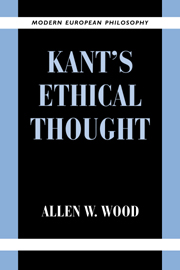Book contents
- Frontmatter
- Contents
- Preface
- Abbreviation
- Introduction
- I METAPHYSICAL FOUNDATIONS
- 1 Common rational moral cognition
- 2 Rational will and imperatives
- 3 The formula of universal law
- 4 The formula of humanity as end in itself
- 5 The formula of autonomy and the realm of ends
- II ANTHROPOLOGICAL APPLICATIONS
- Conclusion
- Notes
- Index
1 - Common rational moral cognition
Published online by Cambridge University Press: 05 June 2012
- Frontmatter
- Contents
- Preface
- Abbreviation
- Introduction
- I METAPHYSICAL FOUNDATIONS
- 1 Common rational moral cognition
- 2 Rational will and imperatives
- 3 The formula of universal law
- 4 The formula of humanity as end in itself
- 5 The formula of autonomy and the realm of ends
- II ANTHROPOLOGICAL APPLICATIONS
- Conclusion
- Notes
- Index
Summary
Grounding ethical theory
I.I. Formulating the principle of morality Kant's project in the Groundwork is simple enough: “the search for and establishment of the supreme principle of morality” (G 4:392). But the project's execution is subtle and complex. The First Section carries out the search by appealing to moral common sense (“common rational moral cognition”) to motivate a more rigorous account of the commitments of common sense (“philosophic moral cognition”) (G 4:392–393). The Second Section makes a new start, bypassing “popular moral philosophy” and employing a philosophical theory of the will to lay the ground for a “metaphysics of morals” (G 4:392, 406). The “supreme principle of morality” is formulated only provisionally in the First Section, as the Formula of Universal Law (FUL). The parallel search in the Second Section has more definitive results: a system of three formulas (two of which are provided with a variant form):
FIRST FORMULA:
FUL The Formula of Universal Law: “Act only in accordance with that maxim through which you can at the same time will that it become a universal law” (G 4:421; cf. 4:402)
with its variant,
FLN The Formula of the Law of Nature. “Act as if the maxim of your action were to become by your will a universal law of nature” (G 4:421; cf. 4:436).
COMMON RATIONAL MORAL COGNITION
SECOND FORMULA:
FH The Formula of Humanity as End in Itself.
- Type
- Chapter
- Information
- Kant's Ethical Thought , pp. 17 - 49Publisher: Cambridge University PressPrint publication year: 1999

